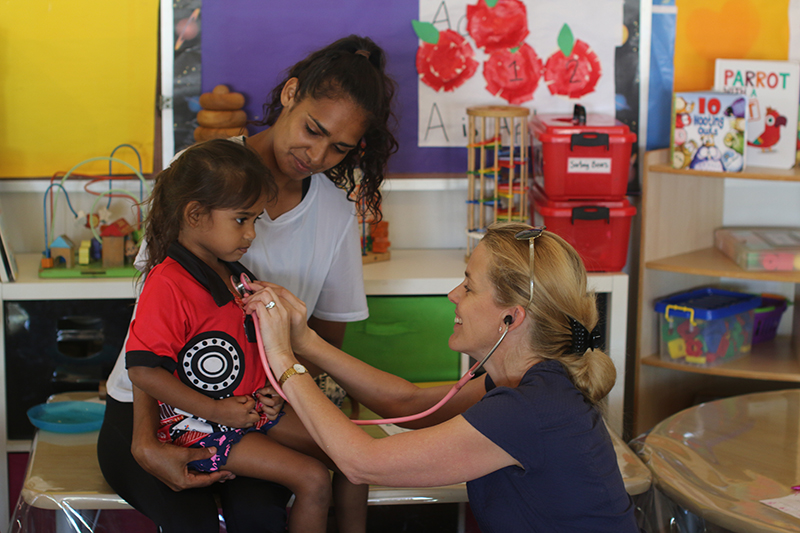
A culturally secure health campaign designed to alert Aboriginal families, community health workers and clinicians to the dangers of a prolonged wet cough has been so successful that it could offer a blueprint for how to manage other chronic diseases affecting Aboriginal communities throughout Australia.
A wet cough experienced by a child for more than four weeks can be a sign of underlying infection which, if left untreated, can lead to irreversible, life-shortening lung damage.
But The Kids Research Institute Australia researchers and Perth Children’s Hospital clinicians Pam Laird and Dr Andre Schultz found the issue was flying under the radar, with cases being missed because families didn’t know they needed to seek help for the problem, and clinicians were often unaware of the need for early treatment.
“At our regular respiratory clinics in the Kimberley we found we were discovering disease quite far down the track,” Ms Laird said.
“When we interviewed families we discovered that not a single one of them had ever received any health information that a wet cough for more than four weeks needed to be treated. But equally, we found clinicians were largely unaware of the need to treat these early symptoms of lung disease.
“So we embarked on a solution to try to see if we could help families recognise wet cough earlier and help clinicians manage it optimally.”
Ms Laird and Dr Schultz began a research project to establish the prevalence of protracted bacterial bronchitis – the condition ongoing wet cough can lead to – amongst children in four separate communities.
At the same time, they partnered with Aboriginal communities and Aboriginal community-controlled medical services to develop a three-month information campaign which included a movie, a flip-chart, posters, and television and radio advertisements featuring West Coast Eagles player Francis Watson, who is from Balgo in the Kimberley.
“As we rolled that campaign out, at the same time we trained the clinicians and local health workers so that if children presented to the clinic with chronic wet cough, the doctors actually treated the children,” Ms Laird said.
“Six months after the campaign had finished we went back to evaluate the results and what we found was really exciting.
“One of the most important things we discovered was that information is power. If we give families health information in a culturally secure way, they will seek help for their children’s cough. Our evaluation revealed that we had almost tripled the number of families seeking help for their children, and we also found we were getting much more accurate medical histories. It was clear these families really cared – all they had needed was information, delivered in the right way.
“The other great result was that the rates of doctors correctly managing children for wet cough went from 55 per cent to 86 per cent, and the number of kids whose coughs resolved went from 5 per cent before this project, to 83 per cent afterwards.
“What it shows is that if clinicians manage children in the early stages, according to best practice, we can actually prevent lung disease altogether.”
Dr Schultz said the next steps were to work towards rolling out the approach throughout Australia, and applying the same principles to other chronic diseases experienced by Aboriginal and Torres Strait Islander people.
“Doctors are generally caring people and motivated to improve their skills to help patients,” Dr Schultz said. “In WA clinicians are increasingly aware of the need to develop skills in providing culturally secure care for Aboriginal patients.”
The work represents a close collaboration and partnership between Perth Children’s Hospital and The Kids Research Institute Australia.
“What this shows is that by working together in true partnerships with the Aboriginal community, where Aboriginal people are co-leading and co-designing the research, real translational health change happens,” Ms Laird added.
A paper detailing the success of the approach, Recognition and management of protracted bacterial bronchitis in Australian Aboriginal children: a knowledge translation approach, has been published in the journal Chest.
- Ms Laird is a respiratory physiotherapist with the Perth Children’s Hospital and Child and Adolescent Health Service (CAHS), and a researcher with the Wal-yan Respiratory Research Centre. Dr Schultz is a paediatric respiratory physician with the Perth Children’s Hospital and a researcher with the Wal-yan Respiratory Research Centre. The Wal-yan Respiratory Research Centre is a partnership between The Kids Research Institute Australia, Perth Children’s Hospital and the Perth Children’s Hospital Foundation.
- Ms Laird and Dr Schultz worked closely with communities, aided by Kimberley Aboriginal Medical Services and the Broome Aboriginal Health Service, to develop the campaign and culturally secure resources to raise awareness about wet cough and its link to lung disease.
- The wet cough project was funded by a Telethon CAHS Allied Health grant and the National Health and Medical Research Council.
About Perth Children’s Hospital
Perth Children's Hospital (PCH) is Western Australia’s specialist paediatric hospital and trauma centre, providing medical care to children and adolescents up to 16 years of age. PCH is part of the Child and Adolescent Health Service (CAHS) which treats children from around Western Australia, and is committed to programs that promote lifelong health in children and adolescents.
